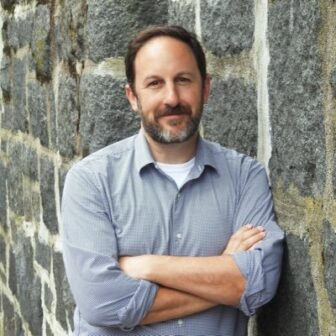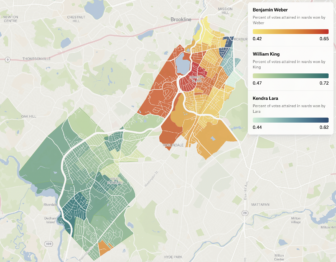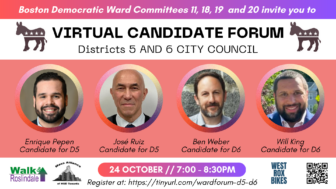Last updated on February 3, 2020
Democrat and Boston resident Robbie Goldstein is challenging U.S. Congressman Stephen Lynch, and answered why he thinks 8th District residents should vote for him, how being a doctor will make him a good congressman, and more.

The 8th Congressional District part of Jamaica Plain and includes two precincts in Raynham, Avon, Braintree, Canton, Cohasset, Dedham, Holbrook, precincts in Milton, Norwood, Quincy, Randolph, Stoughton, Walpole, Westwood, Weymouth, Abington, Bridgewater, Brockton, Easter Bridgewater, Hingham, Hull, Scituate, West Bridgewater and Whitman.
Part of the 7th Congressional District is also in Jamaica Plain and is represented by Congresswoman Ayanna Pressley.
Goldstein lives in Fort Point with his husband Ryan.
Q: Why did you decide to run for the 8th District Congressional seat?
Goldstein: My parents taught me from an early age the importance of caring for your community. My dad was a dentist and my mom managed the office. Together, they taught me the value of investing in your neighbors. Their work inspired me to do everything I can to support my community, which led to medical school, my work in breast cancer research and as a primary care doctor, and ultimately to this campaign.
I’m in this race to guarantee that every person — and every community — has the care and compassion they need to succeed.
I’ve spent my career in the 8th District caring for people who face too many of the same challenges day after day and year after year: gun violence in their neighborhoods, family and friends struggling with substance use, the rising cost of housing, and an expensive and unreliable transportation system, all of which make it harder to get and stay healthy.
Addressing these challenges will require transformative leadership, and we can’t afford to wait any longer. I’m running to bring a fresh perspective and bold leadership to Congress.
Q: Have you met Congressman Lynch before? What is your impression of him?
Goldstein: I have not met Congressman Lynch. Every day, I hear from folks in the district about our shared challenges that have gone unaddressed for too long: the existential threat of climate change, traffic that seems to get worse with every commute, and the rising costs of housing and healthcare taking up more and more of every paycheck.
My impression of Congressman Lynch comes from my own experience and what I’ve heard from other voters and residents: that he has failed to lead on these and other issues that impact every person in the 8th District in one way or another. Whether it’s the epidemic of gun violence or the opioid crisis, climate change or rising income inequality, our collective failure to act means that more and more people suffer.
We need to take bold action to solve these problems, and it will require a new leader in Congress to get that done. This district deserves a representative that shares its values and isn’t afraid to lead with them. I will work in partnership with residents and community leaders to make sure that all of our voices are at the table.
Q: District 8 has been regarded as a conservative district and Congressman Lynch is on the more conservative side of Democrats. Why do you think District 8 voters will vote for you?
Goldstein: Healthcare is not a conservative or a liberal issue — it is a fundamental human right that must be guaranteed for all. When you’re sitting in that hospital waiting room, not only worried if your mom, or your son, or your granddad is going to be okay, but also about how your family is going to afford the treatment they need, you want someone who knows the stress of that situation fighting in your corner.
I treat patients every day who don’t have insurance and are terrified about what that means for their treatment, and for their future when they return home. And, I treat patients who have insurance and still aren’t able to afford the care they need. I’m going to Washington to make sure we close this huge gap in access — a life or death gap for working families in this district.
I’m in this race because the next Congress will decide the future of healthcare in America, and I am the candidate with the most experience to lead on this issue. Across the 8th District, thousands of people are living without health insurance. Many more are living with food insecurity, housing instability, and inadequate access to high quality transportation and jobs that pay a living wage. When voters in the 8th District head to the polls in September, the choice they’ll be making won’t be between conservatism or liberalism: this race is a choice between maintaining the status quo, or taking meaningful steps to strengthen our community.
Q: What is your experience in politics prior to running for District 8? Have you been on town boards?
Goldstein: I have not held elected office before, but I have been a driver of social and cultural change in a large institution — which is what I plan to do as a member of Congress.
As a primary care doctor, every day I saw the ways prejudice, social and economic marginalization, and violence can prevent transgender and non-binary people from receiving the medical care they deserve. For patients like the trans woman suffering from PTSD as a result of violence she experienced as a teenager, it is especially important that we provide gender affirming care — that we recognize and treat people for who they are — and that we make sure she can access the mental health care services she needs.
So, I got to work: my colleagues and I established the MGH Transgender Health Program.
In the beginning, many people thought that this kind of systemic change was too challenging for a healthcare system with 25,000 employees caring for thousands of patients. I built a coalition from the ground up, partnering with transgender advocates, educating as many people as possible about the importance of gender affirming care, and connecting with hospital leaders around our shared values of giving every person the highest quality of care in a culturally sensitive, compassionate, and respectful manner.
I am proud of the work we’ve done to build a program that provides high-quality, personalized care to the transgender and non-binary communities in and around Boston and partners every day with community leaders and advocates. In the process, the importance of transgender care has become a part of the fabric of the institution and will forever be a part of the hospital’s mission.
Our first patients were our biggest teachers. We listened to them and responded to their concerns, bringing in more mental health providers, community resources, and opportunities to be in a safe space. They were a part of the building process and their voices and perspectives are woven into the values and mission of the program.
The gay migrant who left his country after his parents disowned him, the queer student who was forced to hide their identity to get a job, the young trans person who doesn’t feel safe at home or at school — they are why I worked to create the Transgender Health Program and they are why I am running for Congress.
Identifying gaps, building coalitions, and driving solutions is how I’ve done my work in the hospital and I will bring the same approach and dedication to my work in Washington.
Q: How would your work as a primary care doctor specializing in infectious diseases help you be a good congressman? Have you taken a leave of absence from your job to run for Congress?
Goldstein: I care for people as their primary care doctor and have served as a leader, a mentor, and a teacher in the hospital. I’ve treated hundreds of people since I joined MGH, including some of the most vulnerable — undocumented immigrants, those living with or at risk for HIV, people in the LGBTQ community. I am proud to have worked with and for them to address the challenges that prevent them from being healthy. But too many of the challenges we face are bigger than any one person can solve. They require bold leadership and solutions at the federal level.
Healthcare is about more than having an insurance card in your pocket. Transportation is healthcare: you can’t get screened for cancer if you can’t get to the hospital because the train is derailed. Housing is healthcare: programs like Boston Healthcare for the Homeless often bridge the gap when patients are too sick for a shelter, but too well to stay in the hospital.
Over the coming months I will cut back on my time in the hospital to dedicate more time to our campaign, but I will never stop being a doctor. My patients, their stories, and their challenges are what drive me and will motivate my work in Congress.

Q: If elected, what would you want to accomplish in your first 100 days in office?
Goldstein: My priorities in the first 100 days will reflect the most pressing challenges facing our district: healthcare, climate change, and transportation. I will use my experience working in and knowledge of our healthcare system to help write and advocate for legislation to build a single payer system that eliminates the costs and barriers that people in this district and around the country face. I will work with my colleagues to pass the Green New Deal, slowing threats like coastal erosion while creating new jobs in emerging industries. And, I will advocate for significant federal investment in public transportation infrastructure, to ensure that no one is kept from school, work or the doctor because they can’t afford to get there.
I won’t just be a reliable vote for the Democratic caucus. I’m ready to advance new ideas and legislation, including a re-evaluation of the role of the FDA in pharmaceutical pricing, a dramatic shift in how we address the housing crisis in America, and a renewed investment in gun violence prevention and implementation of data-driven interventions to reduce harm.
I am also committed to holding monthly town hall meetings around the District. We will hold each town hall in a different city or town to make sure people throughout the 8th District have a chance to both make their voice heard and hold me accountable.
Q: What else would you want people to know about yourself and campaign?
Goldstein: This work affects me, deeply. When our representatives don’t lead on issues of LGBTQ equality, I see the rights that are denied to Ryan and me. When we lack leadership in Congress that demands investment in gun violence prevention, I see the impact on victims and survivors. When we allow politicians who don’t understand the healthcare system to dictate how healthcare is provided in this country, I see the patients who suffer from high costs and lack of access to care.
I come to this campaign with an understanding of how to engage, listen and respond to the needs of a community and to do the work to build a community where one doesn’t exist. That’s how I built the MGH Transgender Health Program. That’s how I built my campaign team. And, that’s how I’ll approach every day in Congress.




